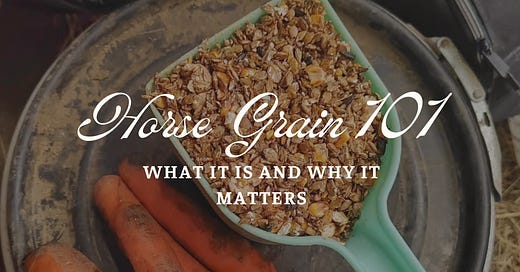Horse Grain 101: What It Is and Why It Matters
Feeding a horse is both an art and a science—it isn’t just about tossing hay into a stall and calling it a day. It’s a balance of nutrition, energy, and knowing exactly what your horse needs to look and feel their best. Enter: grain. Some horses swear by it, others don’t need it at all. But if you’re wondering whether it’s an essential part of equine nutrition or just another trend (like oat milk lattes), we’re here to break it all down.
So, What Is Horse Grain?
Think of horse grain as the power smoothie of the equine world—extra fuel for those who need it. Unlike hay and grass, which provide a steady foundation of fiber, grain is a concentrated energy source. It’s like an athlete adding protein powder to their diet—it’s not for everyone, but for some, it makes all the difference.
Grain comes in different forms, each with its own benefits:
✨ Oats – The go-to choice. Easy to digest and provides steady energy.
✨ Corn – High in calories and starch (translation: handle with care).
✨ Barley – A middle-ground option—more energy than oats but not as intense as corn.
✨ Pellets & Processed Feeds – Custom blends packed with vitamins and minerals for specific dietary needs.
Not every horse needs grain (more on that in a sec), but for some, it’s the key to maintaining peak performance and health.
Why Do Some Horses Eat Grain?
Grain isn’t just about extra calories—it’s about targeted nutrition. Some horses absolutely need it, while others do just fine without. So, when does grain become essential?
✔ For high-energy horses – If your horse is running barrels, jumping courses, or clocking serious training hours, they’re burning through calories and need that extra fuel.
✔ For hard keepers – Some horses have sky-high metabolisms (think: that one friend who eats five meals a day and stays effortlessly lean). Grain helps them keep weight on.
✔ For growing horses – Young horses need extra nutrients to support bone and muscle development.
✔ For horses recovering from illness or injury – Just like we need extra nutrients to heal, some horses benefit from grain during recovery.
For these horses, grain isn’t optional—it’s essential.
Why Would a Horse Not Eat Grain?
Grain might sound like an equine superfood, but it’s not always necessary. In fact, for some horses, it can do more harm than good.
❌ Easy keepers don’t need it. Some horses maintain weight effortlessly on hay and pasture alone. (Must be nice.)
❌ Too much grain = digestive issues. Overfeeding grain can cause colic or laminitis (aka, the last thing you want).
❌ Some horses can’t tolerate grain. Just like some people have to watch carbs, certain horses (especially those with metabolic disorders like insulin resistance) need to avoid grain altogether.
The takeaway? Grain is not a must-have—it’s a case-by-case decision.
How to Feed Grain the Right Way
If your horse does need grain, there’s a right way to do it—and a very wrong way. Here’s how to keep things balanced and healthy:
✨ Introduce it gradually. Going from zero to a full grain ration overnight? Nope. Slow and steady wins the race.
✨ Pair it with hay or pasture. Grain should complement forage, not replace it.
✨ Portions matter. More grain ≠ better nutrition. Overfeeding can cause weight gain and health issues.
✨ Quality over quantity. Not all grains are created equal. If in doubt, opt for a balanced, processed feed over straight oats or corn.
✨ Talk to the experts. A vet or equine nutritionist can help fine-tune your horse’s diet.
Feeding grain isn’t a one-size-fits-all situation. Some horses thrive on it, while others don’t need it at all. The key? Knowing your horse, reading the signs, and understanding that more isn’t always better.
Not every horse is a performance athlete. Not every horse needs extra calories. And sometimes, the best thing you can do is skip the grain and stick to high-quality hay and pasture.
So if you’re still figuring it all out, don’t stress. Feeding horses is about learning, adjusting, and trusting the process. And at the end of the day? Your horse will tell you exactly what they need—you just have to listen.




